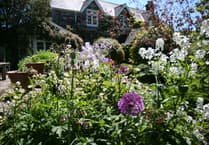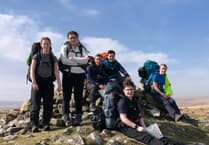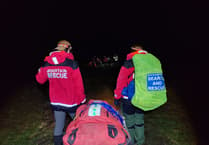DARTMOOR National Park contains some of the most remote and poorly connected parts of England; that could be about to change when the areas become connected to superfast broadband through one of the largest wireless broadband infrastructure projects ever to be undertaken in the country.
On Friday (November 25) Matt Hancock, Minister of State for Digital and Culture, unveiled the roll out of the Connecting Dartmoor and Exmoor (CDE) superfast broadband programme across the national parks. It is being hailed as a game changer for the region’s economy by business and community leaders from across Devon.
Mr Hancock said: ‘Fast, reliable broadband is no longer a luxury, it’s a necessity, perhaps especially in rural areas such as Dartmoor and Exmoor.
‘It’s great to see Connecting Devon and Somerset (CDS) working together with the National Park Authorities, West Somerset Council and Airband on this innovative approach to roll out superfast broadband in such a remote and challenging area.
‘The faster speeds will bring significant benefits to local people, businesses and public services, and open up the national parks to a much wider marketplace so that even more people can enjoy these places of outstanding beauty.’
Cllr Andrew Leadbetter, cabinet member for economy and growth for Devon County Council, said: ‘The roll out to the national parks represents an important element of the second phase of the CDS programme. It will enrich residents’ lives by providing easier access to public services and education resources for our young people, while providing a major stimulus to the farming and tourism sectors which are crucial to the local economy.
‘The innovative approach that has been taken with the roll out across the national parks is also testament to the open procurement route used for the second phase of the programme which ensures we provide competition, choice and value for money to the communities that we are serving.’
Central Devon MP Mel Stride commented: ‘It’s vital that rural areas have the same access to faster broadband as their urban counterparts and I am delighted for my constituents in the Dartmoor National Park area that will receive both social and economic benefits. It will make the region an even more attractive place to visit, work and set up new enterprises.’
Chairman of Dartmoor National Park, Bill Hitchins, said: ‘We are delighted to have supported this new approach to connecting our most rural communities and businesses to faster broadband. National parks are national assets that we are very proud to look after, however they are living, working landscapes that still need good connectivity to ensure our businesses and communities thrive.’
The Airband solution uses state of the art data radio technology delivering speeds of 30mbps or more, ensuring high speed connection where fibre is not available. Its technology is future-proofed so will be able to exceed these speeds in years to come.
The technology works by passing a signal from a radio on a transmitter or mast to a radio attached to the final building. A cable then takes the connection into the building allowing the home or business to connect to the internet the same way as via fibre or a standard broadband connection.
The roll out of the infrastructure has been a major engineering feat. Designing a network in such sensitive and nationally important landscapes as the South West’s two National Parks of Dartmoor and Exmoor has demanded great care and consideration, not only to conserve the moorland skyline but also its rich wealth of nationally important archaeological and wildlife sites.
In addition, groundworks have been challenging due to the difficult terrain and have required the use of specialist equipment to drill through rock before installing poles.
The dramatic topography of the moors has also presented accessibility challenges, where at times vehicles have struggled to climb steep hills or reach very isolated spots. Despite these challenges, works have continued to progress and the connectivity on the moors is now live in areas.
The nature of fixed wireless infrastructure means that there has been no need to dig up roads and lay cables to connect with the exchange points, again minimising the impact of the works on the environment.
Redmond Peel, managing director of Airband, said: ‘We’re delighted to be involved in coming up with a next generation communications solution for one of the most challenging areas in the country in terms of the dense treelines, long distances involved, hills and existing structures. Through our experience of rural deployments and specialist expertise in implementing fixed wireless broadband, we’ve been able to minimise disruption and maintain this area of outstanding beauty.’
Connecting Dartmoor and Exmoor, which forms part of the second phase programme to extend superfast broadband coverage beyond the phase one deployment, is part of the Connecting Devon and Somerset (CDS) superfast broadband programme across the wider region.


-with-lightning).jpeg?width=209&height=140&crop=209:145,smart&quality=75)


Comments
This article has no comments yet. Be the first to leave a comment.